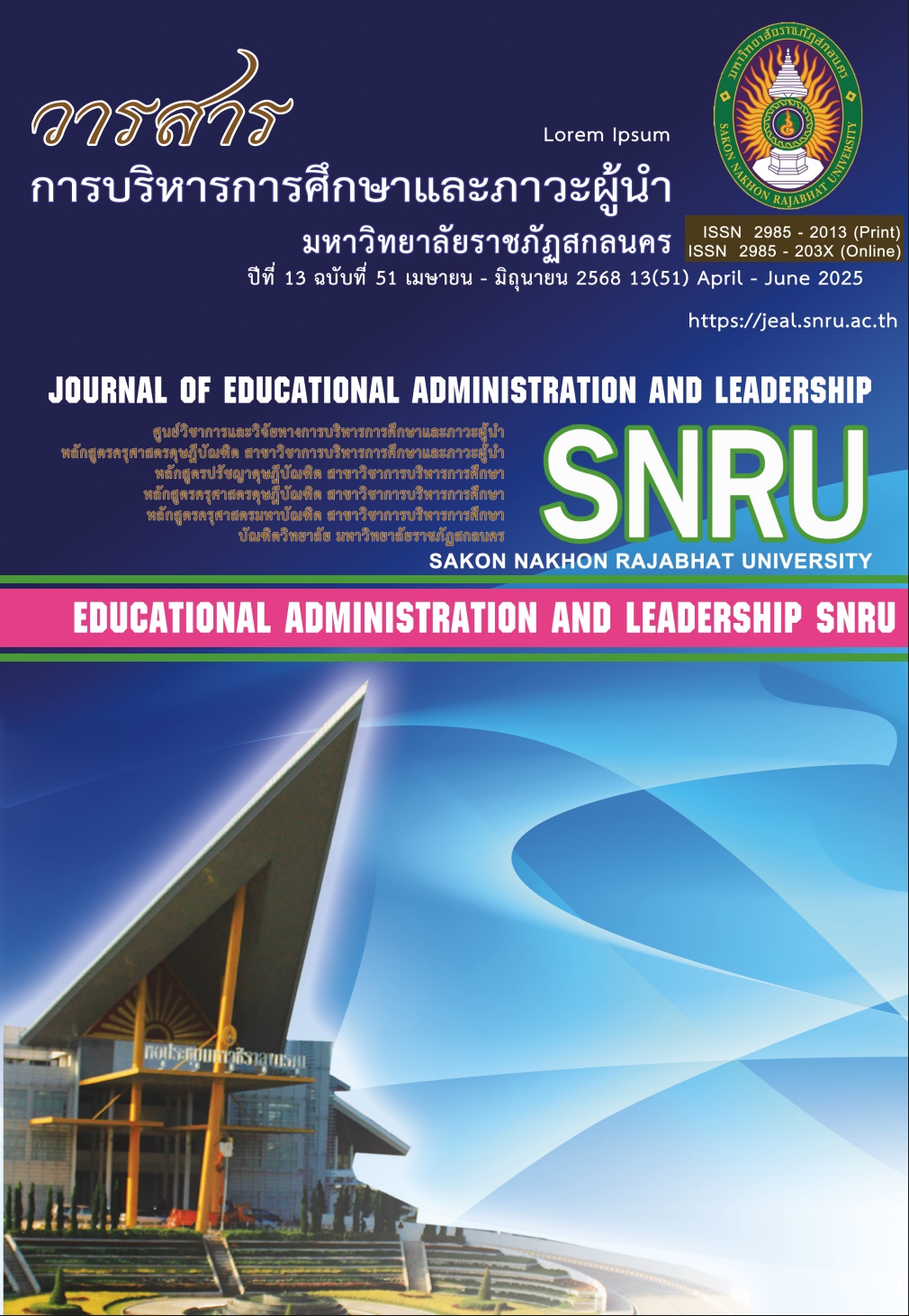

ภาวะผู้นำทางวิชาการของผู้บริหารสถานศึกษาในยุคดิจิทัลที่ส่งผลต่อประสิทธิผลการปฏิบัติงานของครูในโรงเรียน สังกัดสำนักงานเขตพื้นที่การศึกษามัธยมศึกษาสกลนคร
Academic Leadership of School Administrators in Digital Ara Affecting Effectiveness of Teacher Performance in Schools Under the Secondary Educational Service Area Office Sakon Nakhon
ผู้แต่ง
นราธิป พนันชัย, เพ็ญผกา ปัญจนะ, ฤทัยทรัพย์ ดอกคำ
Author
Naratip Pananchai, Penphaka Panjana, Ruethaisap Dokkham
บทคัดย่อ
การวิจัยครั้งนี้มีความมุ่งหมายเพื่อศึกษา เปรียบเทียบ ศึกษาความสัมพันธ์อำนาจพยากรณ์ และหาแนวทางพัฒนาภาวะผู้นำทางวิชาการของผู้บริหารสถานศึกษาในยุคดิจิทัลที่ส่งผลต่อประสิทธิผลการปฏิบัติงานของครูในโรงเรียน สังกัดสำนักงานเขตพื้นที่การศึกษามัธยมศึกษาสกลนคร ตามความคิดเห็นของผู้อำนวยการสถานศึกษา รองผู้อำนวยการกลุ่มงานวิชาการและครูผู้สอน จำแนกตามสถานภาพการดำรงตำแหน่ง ประสบการณ์การทำงาน และขนาดของสถานศึกษา การวิจัยในครั้งนี้เป็นงานวิจัยเชิงสหสัมพันธ์กลุ่มตัวอย่าง ได้แก่ ผู้บริหารสถานศึกษา รองผู้อำนวยการกลุ่มงานวิชาการและครูผู้สอน ปีการศึกษา 2566 จำนวน 346 คน กำหนดขนาดของกลุ่มตัวอย่างโดยใช้ตารางของเครจซี่และมอร์แกนและสุ่มแบบแบ่งชั้นภูมิ เครื่องมือที่ใช้ในการเก็บรวบรวมข้อมูลเป็นแบบสอบถามและแบบสัมภาษณ์ ซึ่งแบบสอบถามเป็นแบบมาตราส่วนประมาณค่า 5 ระดับ ประกอบด้วย แบบสอบถามเกี่ยวกับภาวะผู้นำทางวิชาการของผู้บริหารสถานศึกษาในยุคดิจิทัล มีค่าอำนาจจำแนกระหว่าง 0.238 - 0.526 ค่าความเชื่อมั่น เท่ากับ 0.801 และด้านประสิทธิผลการปฏิบัติงานของครูในโรงเรียน มีค่าอำนาจจำแนกอยู่ระหว่าง 0.232 - 0.592 มีค่าความเชื่อมั่น 0.757 สถิติที่ใช้ในการวิเคราะห์ข้อมูล ได้แก่ ความถี่ ร้อยละ ค่าเฉลี่ย ส่วนเบี่ยงเบนมาตรฐาน สถิติทดสอบค่าที การวิเคราะห์ความแปรปรวนทางเดียว ค่าสัมประสิทธิ์สหสัมพันธ์อย่างง่ายของเพียร์สัน และการวิเคราะห์การถดถอยพหุคูณทีละขั้นตอน
ผลการวิจัยพบว่า
1. ภาวะผู้นำทางวิชาการของผู้บริหารสถานศึกษาในยุคดิจิทัล โดยรวมอยู่ในระดับมากที่สุด
2. ประสิทธิผลการปฏิบัติงานของครูโรงเรียน โดยรวมอยู่ในระดับมากที่สุด
3. ภาวะผู้นำทางวิชาการของผู้บริหารสถานศึกษาในยุคดิจิทัล ตามความคิดเห็นของผู้อำนวยการสถานศึกษา รองผู้อำนวยการกลุ่มงานวิชาการและครูผู้สอน จำแนกตามสถานภาพการดำรงตำแหน่ง ประสบการณ์การทำงาน และขนาดของสถานศึกษา พบว่า ภาวะผู้นำทางวิชาการของผู้บริหารสถานศึกษาในยุคดิจิทัล โดยรวมแตกต่างกันอย่างมีนัยสำคัญทางสถิติที่ระดับ .01
4. การปฏิบัติงานของครูในโรงเรียน ตามความคิดเห็นของผู้อำนวยการสถานศึกษา รองผู้อำนวยการกลุ่มงานวิชาการและครูผู้สอน จำแนกตามสถานภาพการดำรงตำแหน่ง ประสบการณ์การทำงาน และขนาดของสถานศึกษา พบว่า การปฏิบัติงานของครูในโรงเรียน โดยรวมและรายด้านไม่แตกต่างกัน
5. ภาวะผู้นำทางวิชาการของผู้บริหารสถานศึกษาในยุคดิจิทัล และประสิทธิผลการปฏิบัติงานของครูในโรงเรียนโดยรวม พบว่า มีความสัมพันธ์ทางบวกอยู่ในระดับปานกลาง อย่างมีนัยสำคัญทางสถิติที่ระดับ .01 โดยมีค่าสัมประสิทธิ์สหสัมพันธ์ เท่ากับ .683
6. ภาวะผู้นำทางวิชาการของผู้บริหารสถานศึกษาในยุคดิจิทัลที่สามารถพยากรณ์ประสิทธิผลการปฏิบัติงานของครู โดยรวมได้อย่างมีนัยสำคัญทางสถิติที่ระดับ .01 มีจำนวน 3 ด้าน คือ ด้านการพัฒนาบุคลากรด้านวิชาการ
และภาวะผู้นำครู (X4) ด้านการพัฒนาผู้เรียน (X5) และด้านการบริหารหลักสูตรและการจัดการเรียนรู้ในยุคดิจิทัล (X2) สามารถร่วมกันพยากรณ์ได้ร้อยละ 49.50 และมีความคลาดเคลื่อนมาตรฐานของการพยากรณ์ เท่ากับ ±.22178
7. แนวทางการพัฒนาภาวะผู้นำทางวิชาการของผู้บริหารสถานศึกษาในยุคดิจิทัลที่ส่งผลต่อประสิทธิผลการปฏิบัติงานของครูในโรงเรียน จำนวน 3 ด้าน คือ 1) ด้านการพัฒนาบุคลากรด้านวิชาการและภาวะผู้นำครู ผู้บริหารสถานศึกษาควรมีการสนับสนุนและส่งเสริมให้บุคลากรในโรงเรียนเข้าร่วมประชุม อบรม สัมมนาเกี่ยวกับงานวิชาการ มีแนวทาง แนวคิด วิธีการปฏิบัติในการพัฒนาครูในด้านวิชาการ ส่งเสริมให้ครูนำการใช้เทคโนโลยีดิจิทัลมาใช้ในการปฏิบัติงาน 2) ด้านการพัฒนาผู้เรียน ผู้บริหารสถานศึกษาควรมีการส่งเสริม สนับสนุน เตรียมความพร้อมในเรื่องของสื่อ เครื่องมือ อุปกรณ์ต่าง ๆ ในการเรียนรู้ของนักเรียน และ 3) ด้านการบริหารหลักสูตรและการจัดการเรียนรู้ในยุคดิจิทัล ผู้บริหารสถานศึกษา ครู ควรมีการพัฒนาหลักสูตรสอดคล้องกับยุคดิจิทัล นำหลักสูตรมาใช้ในการจัดการเรียนรู้ได้อย่างเหมาะสมและเกิดประโยชน์สูงสุดต่อผู้เรียน
Abstract
The objectives of this research are to investigate, compare, and analyze the relationship of predictive power and to develop strategies for enhancing the academic leadership of school administrators in the digital era. This study examines how such leadership impacts the effectiveness of teacher performance in schools under the Sakon Nakhon Secondary Educational Service Area Office. The research is conducted based on the perspectives of school administrators, deputy directors of academic divisions, and teachers, categorized by their positional status, work experience, and school size. This research employs a correlational methodology. The sample comprises 346 individuals, including school administrators, deputy directors of academic divisions, and teachers, from the academic year 2023. The sample size was determined using Krejcie and Morgan’s tables and was selected through stratified random sampling. The instruments employed for data collection included questionnaires and interviews. The questionnaire utilized a 5-point Likert scale to assess the academic leadership of school administrators in the digital era. It demonstrated a discriminatory power range from 0.238 to 0.526 and a reliability coefficient of 0.848. The questionnaire measuring the effectiveness of teacher performance in schools exhibited a discriminatory power range from 0.232 to 0.592 and a reliability coefficient of 0.835. Statistical methods used for data analysis encompassed frequency, percentage, mean, standard deviation, T - test, one - way analysis of variance (ANOVA), Pearson’s simple
correlation coefficient, and stepwise multiple regression analysis.
The research findings revealed that:
1. The overall academic leadership of school administrators in the digital era is at the highest level.
2. The overall performance of school teachers is at the highest level.
3. When considering the academic leadership of school administrators in the digital era, according to the opinions of directors, deputy directors of academic divisions, and teachers, categorized by position status, work experience, and school size, it was found that the overall academic leadership of school administrators in the digital era showed statistically significant differences at the 0.01 level.
4. According to the opinions of school directors, deputy directors of academic divisions, and teachers, when classified by position status, work experience, and school size, it was found that the performance of teachers in schools did not differ overall or in specific aspects.
5. The academic leadership of school administrators in the digital age and the overall effectiveness of teacher performance in schools exhibited a moderate positive relationship with statistical significance at the .01 level, with a correlation coefficient of .683.
6. The academic leadership of school administrators in the digital era, which predicts the overall performance of teachers with statistical significance at the .01 level, encompasses three key areas: academic personnel development and teacher leadership (X4), student development (X5), and curriculum management and learning management in the digital age (X2). Together, these areas predict 49.50 percent of the variance, with a standard error of the estimate of ±.22178.
7. Guidelines for developing academic leadership among school administrators in the digital era, impacting the effectiveness of teacher performance, are outlined across three areas. 1) Academic Personnel Development and Teacher Leadership: School administrators should actively support staff participation in meetings, training sessions, and seminars focusing on academic pursuits. Clear guidelines, concepts, and procedural frameworks should be established to foster teacher development in academic domains, along with strong encouragement for integrating digital technologies into pedagogical practices. 2) Student Development: Administrators are tasked with promoting, supporting, and equipping learning environments with suitable media, tools, and equipment to enhance student learning experiences. 3) Curriculum Management and Learning Practices in the Digital Age: Collaboration between administrators and teachers is vital in crafting curricular frameworks aligned with contemporary digital paradigms, with optimized implementation to facilitate effective learning management and ensure maximum benefits for students.
คำสำคัญ
ภาวะผู้นำทางวิชาการของผู้บริหารสถานศึกษา, การปฏิบัติงานของครูKeyword
Competencies Of School Administrators, Effectiveness of Academic Affairs Administration in SchoolsNotice: Undefined variable: dataSet in /var/www/html/ArticleView.php on line 116
Notice: Trying to access array offset on value of type null in /var/www/html/ArticleView.php on line 116
บทความทุกบทความเป็นลิขสิทธิ์ของ
Notice: Undefined variable: dataSet in /var/www/html/ArticleView.php on line 116
Notice: Trying to access array offset on value of type null in /var/www/html/ArticleView.php on line 116
เท่านั้น
กำลังออนไลน์: 16
วันนี้: 294
เมื่อวานนี้: 7,862
จำนวนครั้งการเข้าชม: 1,218,005
อาคารบัณฑิตวิทยาลัย ชั้น 2 ตำบลธาตุเชิงชุม อำเภอเมือง จังหวัดสกลนคร 47000
โทร/
แฟกซ์ 0-4297-0093
บรรณาธิการ: รองศาสตราจารย์ ดร.ไชยา ภาวะบุตร
ติดต่อ/สอบถาม: นายธีรเวทย์ เพียรธัญญกรณ์
โทร: 0-4297-0093